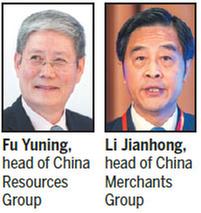Firms to link HK SAR to Belt and Road

Chinese enterprises will further contribute to Hong Kong's economic growth under the Belt and Road Initiative and will serve as a bridge connecting the mainland and the special administrative region to promote cooperation.
"Under the 'one country, two systems' principle, Hong Kong has seen a deeper business relationship with the mainland, and its business environment has been improving in the past two decades," said Li Jianhong, chairman of China Merchants Group, a leading State-owned conglomerate based in Hong Kong.
Founded in 1872 as the first commercial corporation in China, China Merchants Group played a significant role in modern China's economic and social development. In recent decades, it also has contributed to the mainland's shipping industry.
Now, it is also participating in the Belt and Road Initiative. China Merchants Group operates 49 ports in 19 countries and districts that are involved in the initiative.

"More Hong Kong enterprises are seeking opportunities in the mainland while an increasing number of mainland companies are benefiting from Hong Kong's advantages and experience to go global," Li said.
"With the rapid development of the mainland in terms of society and the economy, Hong Kong will see a bigger platform to demonstrate its competitiveness, and its business environment will also be more stable," he said.
The Belt and Road Initiative will be a chance for Hong Kong's further development, according to Li.
China Resources Group was founded in Hong Kong in 1938 and now has seven subsidiary companies listed there.
"Many State-owned enterprises are based and developed in Hong Kong," said Fu Yuning, chairman of China Resources Group.
As a major supplier of fresh frozen food, the group was once called "Hong Kong's vegetable basket", Fu said. In 1972, it shipped petroleum and rice from the mainland to Hong Kong.
In 2003, Hong Kong's economy suffered from the SARS epidemic, and many college graduates had a hard time finding a job. Fu said China Resources Group helped to employ many graduates in the mainland during that period.
In 2007, at the height of the global financial crisis, it also established a fund to provide financial support to students from poor families in Hong Kong and the mainland to finish their studies.
"Many opening-up policies were initially practiced in Hong Kong before they were promoted in the mainland. It provides a unique opportunity for Hong Kong to always stand at the front of the market," Fu said.
In recent decades, Hong Kong's economy had witnessed big changes, and it is facing new challenges with the development of the world economy, according to Fu.
"Our next strategy will be rebuilding the city through increasing our investment and taking the opportunities offered by the country's development plan," he said.
- Zhuhai man given death for car attack
- China revises upper age limit for driver's license
- Infant immunization schedule changes from Jan 1
- Peak season for respiratory illnesses continues
- Former deputy Party chief of Shanxi given life sentence for bribery
- One-year-old, Beijing Library serves book lovers with passion





































